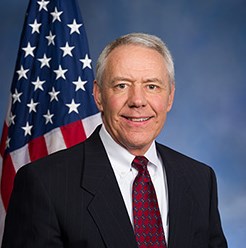On June 14, Representative Ken Buck of Colorado’s Fourth Congressional District reintroduced a bill to Congress that would ban federal funds from being used to teach the 1619 Project in K-12 schools or school districts. A similar bill was introduced in September 2020 by Rep. Buck, though it didn’t pass a vote.
The New York Times released the 1619 Project, written by journalist Nikole Hannah-Jones, in August 2019. The project is a detailed examination of the legacy of slavery in the United States, with the name marking the arrival of the first slaves in Virginia in 1619. The project has support from the Smithsonian and a panel of historians for purposes of fact-checking, research and development. Hannah-Jones was awarded the Pulitzer Prize for Commentary for The 1619 Project in May 2020.
The Pulitzer Center has since collaborated with Hannah-Jones and other scholars to create lesson plans and education curriculum for use in schools around the country to reframe African-American history and the impact of slavery and systemic racism.
“Critical Race Theory is dangerous, anti-American and has no place in our nation’s schools,” Rep. Buck said in a press release. “School curriculum plays a critical role in a child’s development and greatly influences the type of adult they will become. Children shouldn’t be taught that they will be treated differently or will be racist because of their skin color.”
According to the American Bar Association, Critical Race Theory, or CRT, is not a diversity or inclusion training but rather “a practice of interrogating the role of race and racism in society that emerged in the legal academy and spread to other fields of scholarship.”
CRT is used as a legal framework to dissect the social construction of race, as well as how it intersects with other social identities such as sexuality and gender. From its use in analyzing legal cases it has since been examined in higher education, particularly in psychology and sociology, according to the American Bar Association.
"We are unaware of any instance of critical race theory being taught in K-12 schools, as it is a complex legal theory more commonly used at the postgraduate or professional level,” said Alicia Graves, Education Committee Chair for NAACP Boulder County Branch. “We are, however, aware of recent efforts in several states to label all discussion of race and racism as ‘critical race theory’ and scare teachers into stripping race from the curriculum entirely.”
In April 2021, the Biden Administration proposed a new ruling for the Federal Board of Education in updating education standards to better acknowledge the role of diversity in the formation of the United States. The ruling references The 1619 Project, as well as resources in the Smithsonian’s National Museum of African American History.
“Under this priority, the applicants propose projects that incorporate teaching and learning practices that reflect the diversity, identities, histories, contributions and experiences of all students to create inclusive, supportive and identity-safe learning environments,” the proposal states.
Rep. Buck’s bill would restrict funding or penalize schools that teach The 1619 Project or related curriculum. The bill specifies that it would not impact federal funding for students with disabilities or subsidized school lunches.
St Vrain Valley School District Chief Communications Officer Kerri McDermid confirmed that Critical Race Theory is not a part of district curriculum or Colorado Academic Standards in an email to the Leader.
“We are disappointed that Rep. Buck is attempting to use fear-mongering and buzzwords to censor straightforward and accurate discussion of the role race has played in our nation’s history and deny students the opportunity to learn the full extent of that history,” Graves said. “Such censorship is evident in his attempt to ban the use of the 1619 Project, which simply provides an honest history of slavery in the United States. We hope the Congress will reject this bad-faith proposal and give our students the education they deserve instead of attempting to scrub the ugly stains of racism from our history."
Rep. Buck’s office has not responded to further inquiries from the Longmont Leader at the time of publication.



